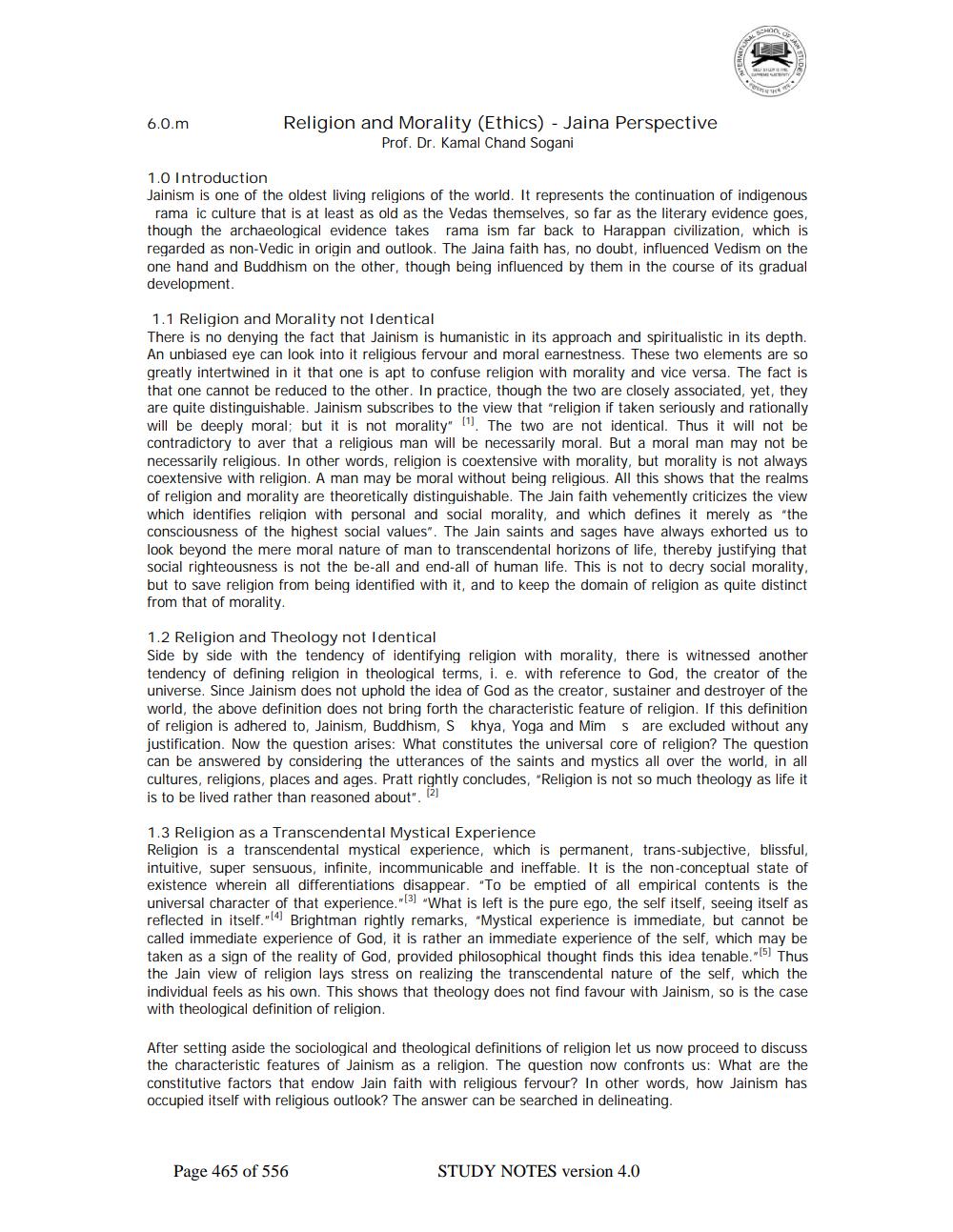________________
6.0.m
Religion and Morality (Ethics) - Jaina Perspective Prof. Dr. Kamal Chand Sogani
1.0 Introduction
Jainism is one of the oldest living religions of the world. It represents the continuation of indigenous rama ic culture that is at least as old as the Vedas themselves, so far as the literary evidence goes, though the archaeological evidence takes rama ism far back to Harappan civilization, which is regarded as non-Vedic in origin and outlook. The Jaina faith has, no doubt, influenced Vedism on the one hand and Buddhism on the other, though being influenced by them in the course of its gradual development.
1.1 Religion and Morality not Identical
There is no denying the fact that Jainism is humanistic in its approach and spiritualistic in its depth. An unbiased eye can look into it religious fervour and moral earnestness. These two elements are so greatly intertwined in it that one is apt to confuse religion with morality and vice versa. The fact is that one cannot be reduced to the other. In practice, though the two are closely associated, yet, they are quite distinguishable. Jainism subscribes to the view that "religion if taken seriously and rationally will be deeply moral; but it is not morality" [1]. The two are not identical. Thus it will not be contradictory to aver that a religious man will be necessarily moral. But a moral man may not be necessarily religious. In other words, religion is coextensive with morality, but morality is not always coextensive with religion. A man may be moral without being religious. All this shows that the realms of religion and morality are theoretically distinguishable. The Jain faith vehemently criticizes the view which identifies religion with personal and social morality, and which defines it merely as "the consciousness of the highest social values". The Jain saints and sages have always exhorted us to look beyond the mere moral nature of man to transcendental horizons of life, thereby justifying that social righteousness is not the be-all and end-all of human life. This is not to decry social morality, but to save religion from being identified with it, and to keep the domain of religion as quite distinct from that of morality.
1.2 Religion and Theology not Identical
Side by side with the tendency of identifying religion with morality, there is witnessed another tendency of defining religion in theological terms, i. e. with reference to God, the creator of the universe. Since Jainism does not uphold the idea of God as the creator, sustainer and destroyer of the world, the above definition does not bring forth the characteristic feature of religion. If this definition of religion is adhered to, Jainism, Buddhism, S khya, Yoga and Mim s are excluded without any justification. Now the question arises: What constitutes the universal core of religion? The question can be answered by considering the utterances of the saints and mystics all over the world, in all cultures, religions, places and ages. Pratt rightly concludes, "Religion is not so much theology as life it is to be lived rather than reasoned about". [2 [2]
1.3 Religion as a Transcendental Mystical Experience
Religion is a transcendental mystical experience, which is permanent, trans-subjective, blissful, intuitive, super sensuous, infinite, incommunicable and ineffable. It is the non-conceptual state of existence wherein all differentiations disappear. "To be emptied of all empirical contents is the universal character of that experience."[3] "What is left is the pure ego, the self itself, seeing itself as reflected in itself."[4] Brightman rightly remarks, "Mystical experience is immediate, but cannot be called immediate experience of God, it is rather an immediate experience of the self, which may be taken as a sign of the reality of God, provided philosophical thought finds this idea tenable.[5] Thus the Jain view of religion lays stress on realizing the transcendental nature of the self, which the individual feels as his own. This shows that theology does not find favour with Jainism, so is the case with theological definition of religion.
After setting aside the sociological and theological definitions of religion let us now proceed to discuss the characteristic features of Jainism as a religion. The question now confronts us: What are the constitutive factors that endow Jain faith with religious fervour? In other words, how Jainism has occupied itself with religious outlook? The answer can be searched in delineating.
Page 465 of 556
STUDY NOTES version 4.0




